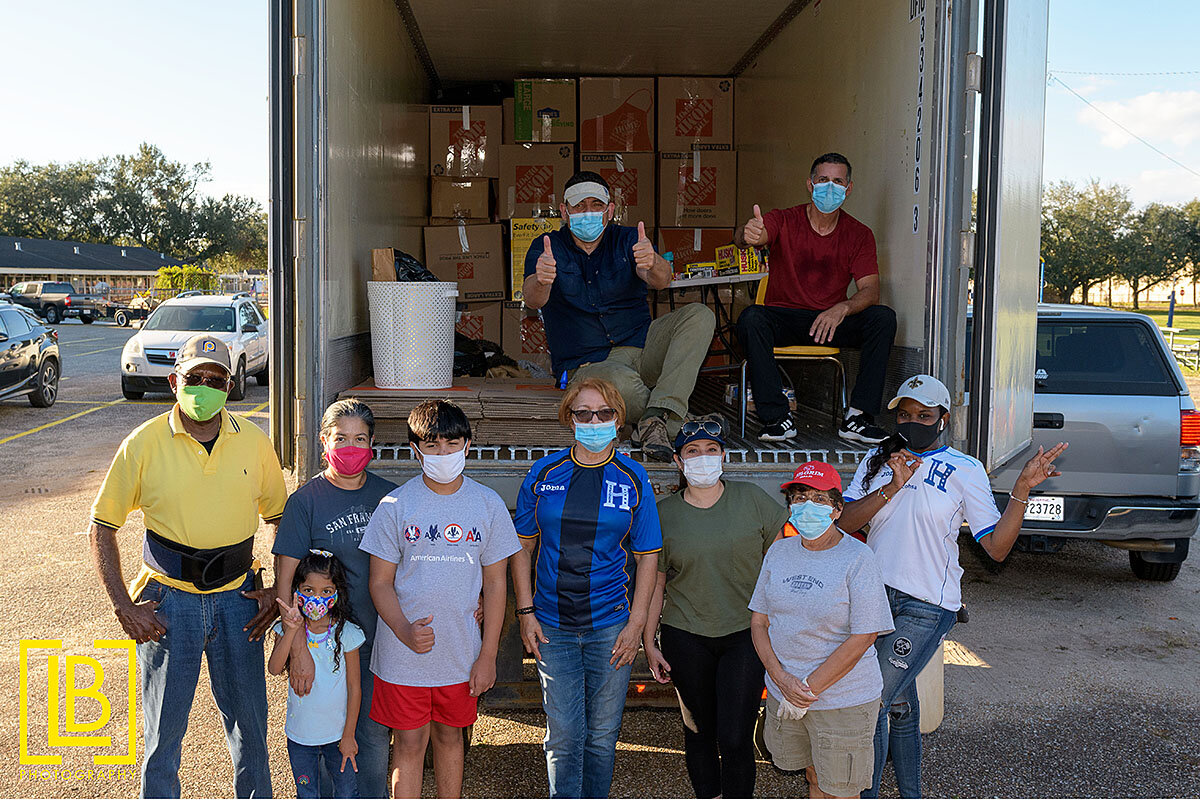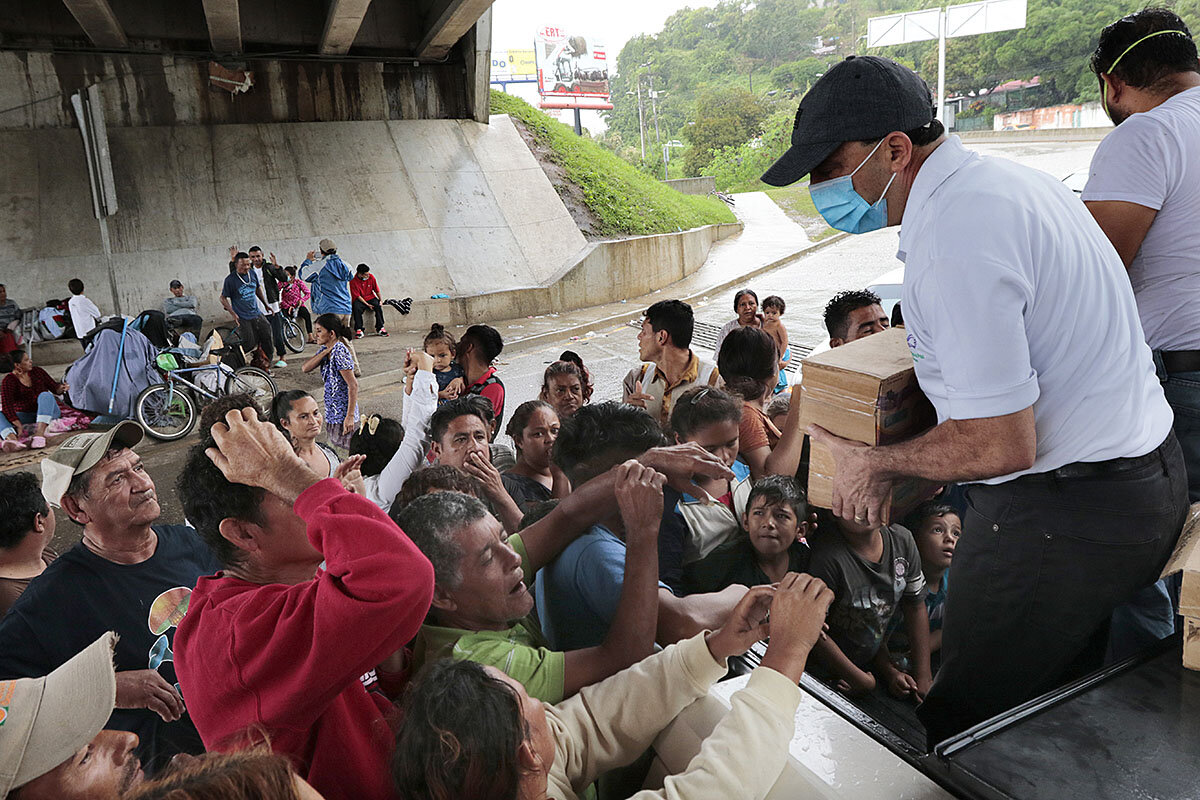At home and away, Hondurans pitch in toward hurricane healing
Loading...
| Mexico City
When Dr. María Angélica Milla saw the exodus of families – sopping wet and in distress, traveling by foot and by boat – fleeing Hurricane Eta as it touched down in Honduras this month, the physician got on the phone with an old friend.
“I asked him for his keys,” she says of the elementary school principal she rang, whose school had been shuttered for months due to the coronavirus.
He agreed to lend her the space, and that first night more than 300 people slept on the floor in the dust-covered classrooms of the Escuela Luis García Bustamante in San Pedro Sula.
Why We Wrote This
For many Hondurans, trust in the government has been waning for years. So in the wake of back-to-back hurricanes, they’re looking to each other for support, rallying Honduran communities both at home and abroad.
“The community has shown up,” says Dr. Milla of the response to Hurricanes Eta and Iota. People in this drenched corner of northern Honduras have used private boats to rescue neighbors, and donated the little they have to feed and clothe the displaced. More than 3.3 million Hondurans have been impacted by the back-to-back storms, and an have been displaced from their homes.
“People here have dry clothes, they have food, we have some medical assistance, not nearly enough beds” she says of her efforts alongside a network of local pastors and church groups, which have set up informal shelters for nearly 600 people. There are roughly 80 operating in San Pedro Sula, but hundreds of people are sleeping under bridges and overpasses due to lack of space and COVID-19 concerns. “Honduran citizens have taken charge of the response to this tragedy. It’s out of good will, but at the same time, we don’t have a choice: [citizens] are stepping up because we have to.”
The Honduran government failed to give citizens early warnings before Hurricane Eta, and its response to the disasters has been disorganized and slow, observers and victims say. But it’s not just two back-to-back hurricanes eroding trust in officials. From a coup in 2009, to the contested reelection of President Juan Orlando Hernández in 2017, the government has lost legitimacy in the eyes of many citizens. The country has a poor track record on transparency, and an internationally-backed anti-corruption body earlier this year. Elections are coming up next year, which has already raised concerns about officials using recovery resources for vote-buying.
“The government response has been really weak,” says Lester Ramírez, director of governance and transparency at the Association for a More Just Society, a nongovernmental organization in Tegucigalpa. “I think everyone was expecting more from them,” since Honduras has been here before, when Hurricane Mitch devastated the country just over two decades ago.
“There’s a phrase people have been saying the past two weeks: Solo el pueblo salva al pueblo, only the people save the people,” Mr. Ramírez says. “Hondurans see each other as the only answer to their problems right now.”
Help from afar
In 1998, Hurricane Mitch marked one of the worst natural disasters in Central American history, wiping out entire communities. Mass landslides and flooding sent tens of thousands of Hondurans packing, many seeking protection in the United States.
At the time, the international community was quick to respond with aid packages, and the U.S. granted Temporary Protected Status for Central Americans. Today, the landscape is transformed: governments across the globe are consumed by the coronavirus response and subsequent economic challenges at home. And the U.S. has taken a step back from development aid and leadership in the region, cutting USAID funding in 2019. After Eta, USAID in humanitarian aid; after Iota, it �����ǰ���.
The estimated economic loss from Hurricane Eta ranges from 10%-20% of Honduras’ GDP, or roughly $5 billion dollars. Subsequent damage from Iota is expected to further inflate those numbers.
One positive result of Mitch, however, is a hearty diaspora in the U.S. who recognize the urgency of these disasters. The Honduran community across the United States – from New York to Texas, Florida to Louisiana – has rallied to send money and supplies. For Lucas Barrios, who moved to Louisiana in 1979, it’s moments like Hurricanes Eta and Iota when he feels most connected to his home and countrymen.
As part of the nonprofit Hondureños Unidos en Louisiana, Mr. Barrios and other volunteers are raising funds and gathering nonperishable goods to send to his hometown of La Ceiba, a hard-hit Caribbean port city.
“It’s a responsibility for me to organize efforts like this,” says Mr. Barrios, a former Honduran diplomat turned disc jockey and professional photographer, who is working to fill a shipping container in Metairie, Louisiana. “This is a natural disaster compounded by a human disaster. The human part is the government.” Mr. Barrios says he fought to ensure the shipping container would be received by a Catholic bishop in La Ceiba, instead of government officials.
“It’s the responsibility of Hondurans to take care of each other because the government won’t.”
“No quick fix”
Cut-out paper flowers and academic calendars still decorate the walls of the Escuela Luis García Bustamante, but classrooms have been transformed into temporary dorm rooms. Most here sleep on the hard, concrete floor at night and sit in small wooden desks in the damp courtyard during the day. Regular downpours add to the stress of what awaits people back home.
Rafael Álvarez Martínez is staying in one room with 25 of his extended family members. They fled their community in the Rivera Hernández section of San Pedro Sula by foot when Eta touched down, sloshing through the rising waters with no clear destination in mind.
“We lost everything. I don’t know if I’ll even be able to repair my house,” he says after visiting his Garifuna, or Afro-Indigenous, neighborhood. Most everything is still under water, he reports.
He’s not holding out hope for much help from the government. “I haven’t heard a thing from the municipality,” he says. “My only hope is God and putting in the hard work to recuperate what we lost.”
Honduras ranks of Transparency International’s Corruption Index, placing 146th out of 180 countries in 2019. Elections are scheduled for 2021, which has observers like Mr. Ramírez on high alert for clientelism and misuse of funds in the government’s disaster response.
Already, Mr. Ramírez is noticing red flags. He says the government is pushing to use direct procurements of items like temporary bridges, which means no public cost-benefit analyses. “The ideal scenario is one where the government opens up the decision-making process to include a committee of experts across the private sector, NGOs, multilaterals, and international donors,” says Mr. Ramírez.
Although it’s inspiring to see the unity of Hondurans at home and abroad, what is happening is a direct result of the loss of faith in the government over the past decade, observers say.
“People don’t believe help will arrive as it should or they think if it does come it will be politicized,” says Leonardo Pineda, who is part of a network of pastors helping support citizen-run shelters. “That’s a serious problem and there’s no quick fix.” And the long-term implications could be grave, including even more reliance on criminal groups in communities overlooked by the government, and, most everyone agrees, more migration.
Dr. Milla, who teaches social psychology at the Catholic University of Honduras, says she feels a huge responsibility to carry out this work.
“Most of the donations we’ve received come with one condition: Don’t use this for any project where the government’s involved.”










